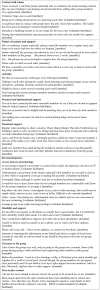Shared social identity and perceived social support among stroke groups during the COVID-19 pandemic: Relationship with psychosocial health
- PMID: 35139581
- PMCID: PMC9111261
- DOI: 10.1111/aphw.12348
Shared social identity and perceived social support among stroke groups during the COVID-19 pandemic: Relationship with psychosocial health
Abstract
Community-based peer support groups for stroke survivors are common in the United Kingdom and aim to support rehabilitation. This study of 260 stroke survivors across 118 groups nationally used an online survey format, completed on average 3 months into the pandemic. Analysis of both quantitative and open-ended responses provided insights into how stroke group members maintained contact during the COVID-19 pandemic and how the group processes of shared social identity and perceived social support related to psychosocial outcomes (self-esteem, well-being and loneliness). Group members adapted to the pandemic early through telephone calls (61.6% of participants) and internet-based contact (>70% of participants), although also showed a desire for greater contact with their groups. A stronger sense of shared social identity and perceptions of social support from the stroke groups were weakly associated with reductions in loneliness among members, and greater perceived social support was associated with higher self-esteem. However, having poor health and living alone were more strongly associated with more negative psychosocial outcomes. The discussion considers how barriers to contact during pandemics can be managed, including access and use of online communication, limitations imposed by stroke-related disability, and how the experience of feeling supported and social identification can be better nurtured within remote contexts.
Keywords: group support; loneliness; self-esteem; social identity; well-being.
© 2022 The Authors. Applied Psychology: Health and Well-Being published by John Wiley & Sons Ltd on behalf of International Association of Applied Psychology.
Conflict of interest statement
All authors report the Stroke Association funding for the work under consideration but no other conflicts of interest.
Figures
References
-
- Alzheimer's Society . (2020). Worst hit: Dementia during coronavirus.
Publication types
MeSH terms
LinkOut - more resources
Full Text Sources
Medical



